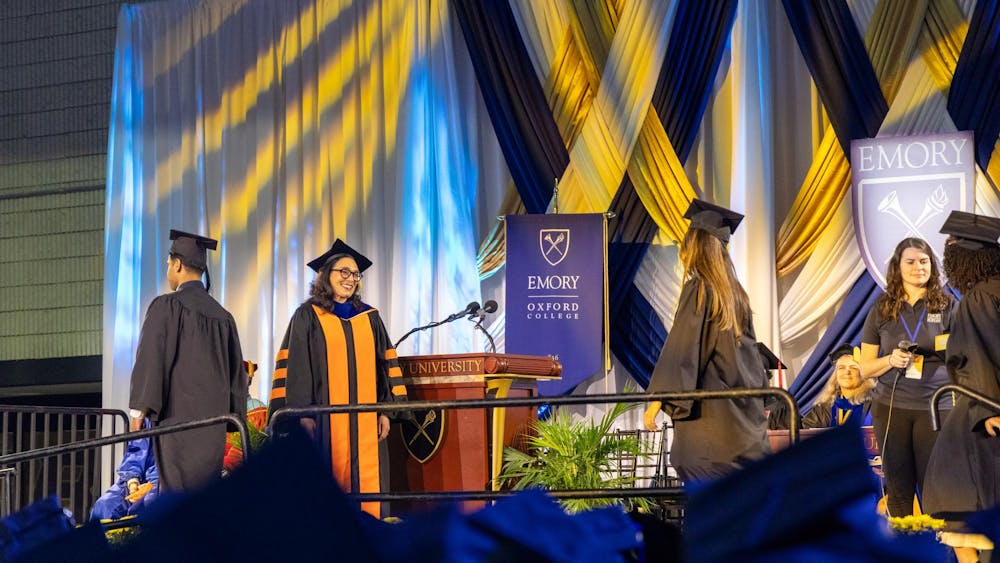The 50th legislature of the Student Government Association (SGA) convened Monday night to discuss the draft of a bill to split the current SGA into the Undergraduate Student Government Association (USGA) and the Graduate Student Government Association (GSGA). The bill resulted from legislators’ concerns about the lack of a representative graduate student voice in SGA.
Legislators heard presentations about two separate proposalslastweek, one by SGA President and College senior Max Zoberman and SGA Executive Vice President and Goizueta Business School junior Gurbani Singh and the other by GSGA President and Goizueta Business School graduate student Jared Greenbaum. While Zoberman and Singh’s proposal called for policy change to make financial representation more proportional for undergraduate and graduate students, Greenbaum’s proposal called for a split into two autonomous governing bodies.
This week’s meeting convened in light of a Nov. 13 memo from Zoberman to the SGA legislature, in which he fully endorsed Greenbaum’s proposal. Zoberman was unable to attend the meeting.
“For a second, [SGA] had come to a tough spot where progress had come to a standstill, and we weren’t doing our jobs because I was so wrapped up in talking about why [SGA and GSGA] were different [from each other],” Zoberman said in an interview with the Wheel. “Despite the fact that I thought the unified form of government was what was best for the organization, what was not best ... [was] to insist upon it even when [everyone else] was telling me something opposite.”
Goizueta Business School Representative and graduate student Mark Neufeld, School of Law Representative and graduate student Stephen Lang and SGA Governance Committee Chair and College junior William Palmer volunteered to draft a bill that would reflect Greenbaum’s proposal. Speaker of the Legislature and College junior Justin Sia said that there is currently no planned date when legislators will vote on a finished bill.
Legislators said that a successful split would require collaboration and effective communication between USGA and GSGA.
To facilitate that collaboration, legislators discussed a joint governance committee, which would consist of both USGA and GSGA representatives and would be responsible for communication between the two bodies. Greenbaum proposed last Monday that the eight-seat committee be filled by the president, executive vice president, divisional treasurer and a legislative representative of both USGA and GSGA. The logistics of the committee would be determined at a later time by the legislative body.
“The graduate students don’t want to pull out and leave the undergraduate students in the lurch,” Lang said. “This is all about finding a way to ... have things done on a more transparent and equal basis.”
In addition, Neufeld said that a split could increase the student activities fee of graduate students to ensure that a GSGA student activities fund would have sufficient resources. Graduate contribution to the current student activities fund amounts to about $120,000, or 26 percent of the total student activities fund, Neufeld said. If GSGA used total graduate contribution to fund its student activities fund, it would span only about $30 per graduate student. However, he also said that it would be possible to prevent that increase, and asked for suggestions to avoid the higher fee.
Legislators expressed concerns that if a split occurred, USGA responsibilities would overlap those of College Council (CC). When other legislators suggested merging USGA and CC, Singh said that legislators would have to consider the organizations’ “cultural differences” before implementing such a policy.
Zoberman said it is important to reach a conclusion in “a relatively expedient manner.”
“We still have all kinds of really important issues that we have to see through that we haven’t had the opportunity to realize because we have spent, at this point, a few months, circling the same issue,” Zoberman said.
Issues on the backburner include a student experience subsidy fund, campus safety and mental health support, according to Zoberman.
Greenbaum said that the sooner a SGA split bill is passed, the more time SGA will have for a transition in governance.
Should the bill pass, it will go to a student-wide referendum, Greenbaum said.
Read More
Trending







